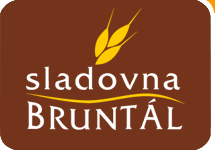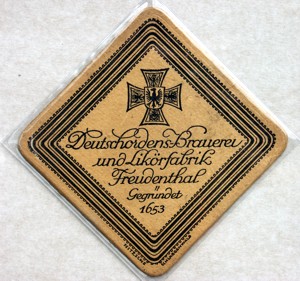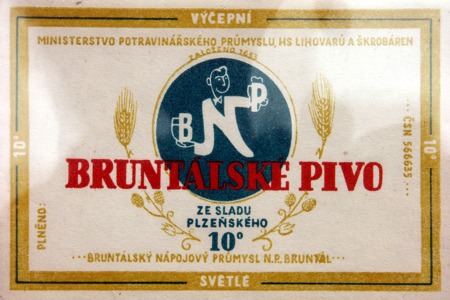
MALT
MALT SPROUTS
MALT EXTRACTS
FUME SWEETWORT
HORAL HOME-MADE BEER
SLADOVNA, spol. s r.o.
Karolíny Světlé 1488/4
792 01 Bruntál
Czech Republic
Tel.: +420 554 712 874
sladovnabruntal@email.cz
HISTORY OF MALTING AND BREWING IN OUR TOWN
Brewing and the Czech nation have gone together since time immemorial. No wonder then, that a privilege for brewing ranked among the most significant municipal privileges at times when towns were being founded. The brewery privilege granted the bourgeoisie an exclusive right for beer production and its tapping within the town and pertaining villages. According to the archives, in Bruntál, the oldest town in the Czech Crown Lands, 109 houses had the brewery privilege in the late 13th century. Unfortunately, local archives do not say the precise date when the burgher brewery was founded – the predecessor of the present establishment. The first and most ancient piece of information about the burgher brewery can be seen in the "Fate of Bruntál – Memorial Book" by Stellwag in the paragraph of "Rendering four villages pertaining to Bruntál to Bernhard of Vrbno in 1568", which says that Bernhard, the gentleman from Vrbno in Bruntál concluded a "Lion agreement" with the town drawn up on the day of Restoring of the Virgin Mary in the year after Christ our Lord the Saviour in 1568 and for rendering of four villages, he pledged to help the town with making repairs to town ramparts and retrieved into use a "Brewery and malt house located in the town, including brewing pans and all other benefit inured to him from that". The notice also implies that the brewery was located in the main square, which was quite an unfortunate place as the danger of fire was imminent and the gentry was concerned with relocating it. From 1653 another new brewery, established by the Teutonic Knights, existed within the estates of the castle park in Bruntál and its production was much later transferred to the premises of Seliko.

There is no other information about the town brewery until the 19th century. The statement of a citizen with brewing rights, Simon Riedl (7/5/1800), implies that brewing was not very profitable at that time. Expenditures for brewing of 98 gyles reached 151 florins and 30 kreutzers, the income 190 florins and 27 kreutzers. The small profit also includes benefit from the tap and earnings for fermentation, which was processed in cellars in the houses of citizens with brewer right. 1 litre of beer cost 8 measure hellers at that time. It is known that Mr Florián Hadwiger was the tenant of the burgher brewery before 1834 and that in 1834 the burgher brewery had a new tenant, Mr Kubelka, who used horse carriages to deliver beer to pubs in surrounding villages for prices considerably lower than the manorial brewery. After the public houses in Andělská Hora ceased taking beer from the brewery of the aristocracy and preferred the town beer, the manorial authorities complained to the municipal council demanding a ban on beer selling from the burgher brewery to the surrounding villages. The municipal council issued a decision that the price of the town beer must not be lower than the price of the manorial beer. The tenant was obligated to "make true, health serving beer every time in such amount and quality that not only local citizens but also demands of other buyers including consumers from out of town will be satisfied." Apart from accomplished beer with alcoholic strength of 14°, unfermented beer was also available upon request, as was customary with previous tenants. The records from the following years deal solely with constructional issues like kiln repair, malt floors, cellars and water pipes. Money was short, though, and so only the most urgent tasks were carried out; however, the orders were always submitted solely to masters of Bruntál. At a general assembly on 10/4/1864, the chairman Anton Luft asked to hire the brewery for 6 years and committed himself to carrying out all necessary repairs at his expense. His requirements were met and, among other things, he was allowed to sublet the brewery to a trustworthy person who would maintain the brewery with the pub for the time stipulated. Mr. Luft used the opportunity to rent the brewery to Nathan Hamburger, to whom the previous tenant Mr Kubelka ceded his rights on 1/10/1864. In 1870 Mr Hamburger built a new lager cellar, probably at his expense, in the street U potoka and he bought the whole town brewery on 10/7/1871. The roof of the brewery caught fire seven years later; nevertheless, the state of the brewery kept on improving.
A new modern malt house was added in 1884. The municipal building authority raised objections against the malt house construction. Mr Hamburger lodged an appeal to the Provincial Governance in Opava who decided in his favour, justificating this verdict with the statement that each firm has a right to produce everything it needs for the production of their final product; thus Mr Hamburger was entitled to make malt. The malt orientation appears in other documents as well – in 1906 Mr Hamburger rented a publican trade to the Teutonic Knights and in 1907 ceded them the maltage right too. On 13th September 1907, C. K. Provincial and Commercial Court in Opava acknowledged the change of company name from "Brewery and export malt house" to "Malt making – owner N. Hamburger". This was the end of the tradition of making beer in the town brewery in Bruntál. The beer of Bruntál was brewed in the former regular brewery (Seliko) until 1956 (see picture and labels). The beer with the epithet "bruntálské" did not reappear on the market until 1993, when our company started producing sets for preparation of the home-made beer brand Horal.
